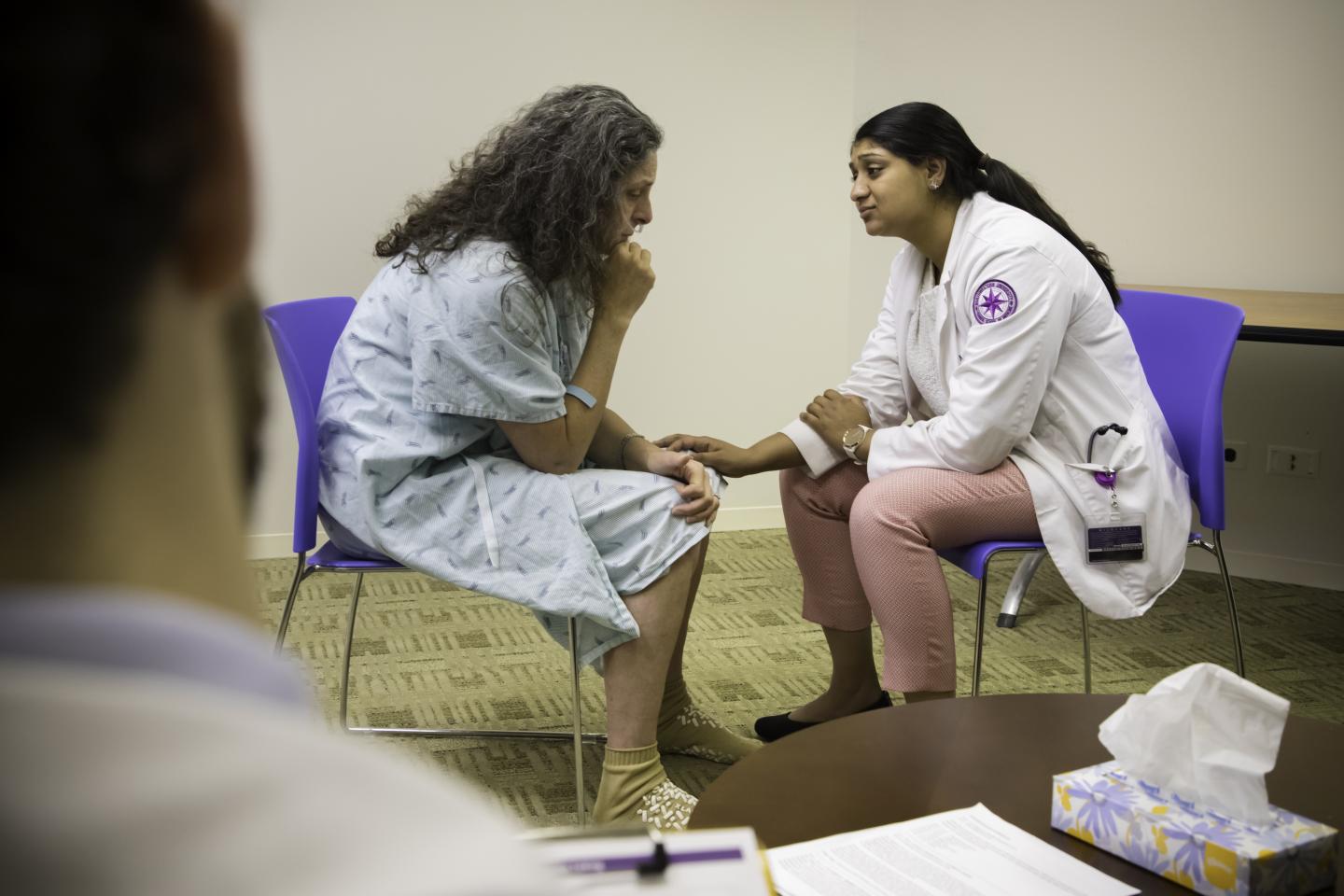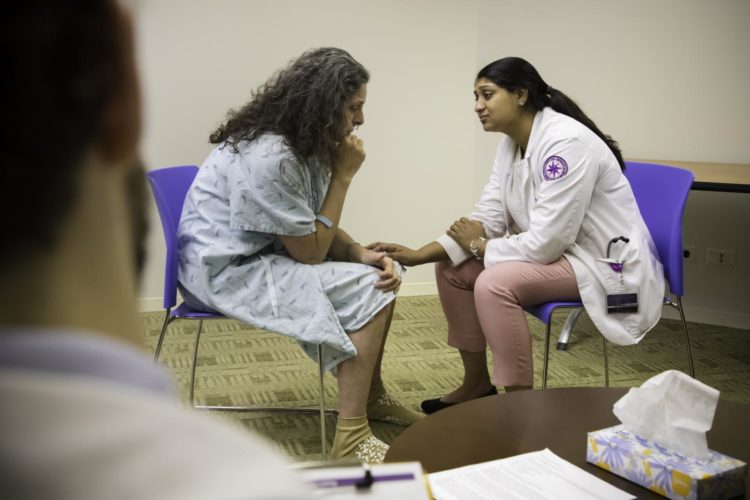Study finds new simulation-based training helps doctors break bad news more effectively

Credit: Northwestern University
We’ve all feared hearing a doctor say, “We need to talk.”
It’s even scarier if the physician is robotic, speaks in jargon or isn’t clear about next steps.
Despite known protocols and recommendations on how to break bad news to patients, many physicians report insufficient training about how to conduct these challenging conversations. Northwestern University Feinberg School of Medicine has found a better way, according to a newly published study.
A new class offered to Feinberg medical students uses an approach called “simulation-based mastery learning” to train physicians to have difficult conversations with patients in a clear and compassionate way.
Students practice with faculty and trained actors until they can demonstrate mastery of the key skills, including how to communicate news without jargon, how to listen to patients’ concerns, how to react to a wide variety of emotional responses and how to clearly talk through treatment options.
The study found every medical student who received the interactive training gained the skills necessary to have these hard conversations. Additionally, 100% of students reported they would recommend the course to a colleague.
This is the first study to show it is possible to embed rigorous simulation-based mastery learning of communication skills into the clinical training of medical students. The paper was published Feb. 18 in the journal Academic Medicine.
‘Knowing they have a partner in this’
“We know patients and families remember these conversations forever,” said first author Dr. Julia Vermylen, assistant professor of medicine and medical education at Feinberg. “It’s better to practice these skills in a simulated environment where no one is harmed so that when you do it in real life, people will understand the news, their next steps and know they have a partner in this.”
Doctors have long been trained to deliver bad news by role playing with fellow students or following mnemonic devices, Vermylen said. This class is different because it uses a mastery learning approach that had previously mostly been used to teach procedures such as inserting an IV into a patient’s neck. In the mastery learning approach, if a student doesn’t pass at first, they have to repeat the simulations until they do, which ensures a uniform level of competency, or “excellence for all,” Vermylen said.
“No student can slip through the cracks,” Vermylen said. “That’s the point of the mastery learning approach. There’s no bell curve here.”
Frequent challenges in breaking bad news
“One mistake students often make is they get so focused on the medical information that they forget to recognize the emotional impact of the news on the patient,” said senior author Dr. Gordon Wood, associate professor of medicine and medical education. “When someone hears bad news, there usually is a flood of emotions and, if the doctor keeps talking about medical information in that moment, patients often report that they didn’t hear anything that was said.
“Students need to learn to pause to give the patient a moment to react and they need to gain the skills to help the patient process this new reality,” Wood said. “When this is done well, patients feel supported and the emotional flood recedes enough that they can begin to hear about the medical plan.”
How the training works
Instructors evaluate a student’s communications skills before the training by watching a one-on-one videotaped simulation of the student breaking bad news to a trained actor. (In the study, the students had to inform the patient their recent headaches were caused by a brain tumor.) The students then receive feedback on their performance and, in small groups of four to six medical students and a faculty member, they get a chance to practice the skills they missed with trained actors portraying a variety of clinical scenarios and different emotional response (e.g. sadness, anger, worry, etc.). The students are able to take a “time out” during the scenarios and brainstorm different approaches to challenging situations then restart the encounter to try the new skill.
Medical students are instructed to base their conversations on a patient’s response and needs. Sometimes a patient might need more information; other times, they just need a shoulder to cry on.
Students reported liking the curriculum. As one student said, “This was definitely the first role play where I felt I truly learned a lot. It was so helpful to pause as we went along so we got real-time feedback.”
“The doctor needs to serve all those needs of information, guidance and emotional support,” Wood said. “We teach a general framework and set of skills, then use the simulations to practice applying it in different situations.”
After the training, the students undergo another one-on-one videotaped simulation of breaking bad news to an actor. If they demonstrate mastery of the skills, they are done, but if not, they practice more until they can show mastery. In this way, the length of each student’s training may vary but in the end, they all gain the skills needed to share bad news in a way that is both understandable and caring.
###
Other study authors include Dr. Diane Wayne, Elaine Cohen and William McGaghie.
Funding for the study was provided by the Zell Family Foundation Readiness for Residency Program.
Media Contact
Kristin Samuelson
[email protected]
847-491-4888
Original Source
https:/
Related Journal Article
http://dx.





